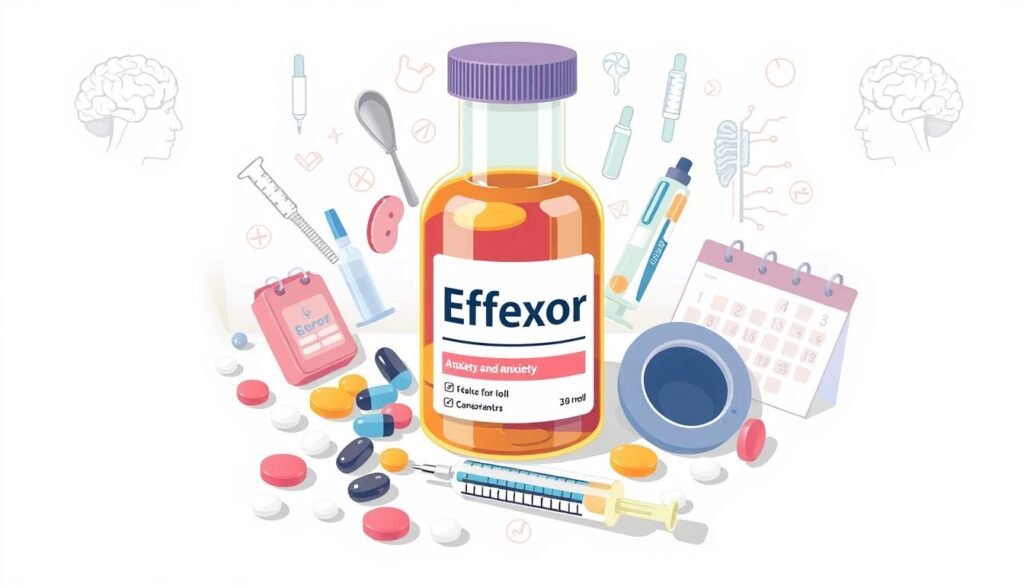About 40 million adults in the US are hit by anxiety disorders. It shows how important medicines like Effexor are for managing anxiety. Effexor, known as an SNRI, often gets compared to SSRIs such as Lexapro and Zoloft. Knowing the differences between these meds is key for those looking for the right treatment.
This piece dives into comparing Effexor with other antidepressants. We’ll look at how well they work and their side effects. This info will help you make smart choices for your mental health care.
Key Takeaways
- Effexor is an SNRI, while other antidepressants like Lexapro and Zoloft are SSRIs.
- Understanding the effectiveness of Effexor vs other antidepressants for anxiety is critical for treatment.
- The review of side effects is essential when choosing an antidepressant.
- Medications such as Effexor have shown promising results in clinical trials for generalized anxiety disorder.
- Financial considerations, such as prescription costs, play an impactful role in medication choice.
- Consulting with a healthcare provider is necessary to find the most suitable medication.
Understanding Effexor and Its Mechanism
Effexor, a well-known antidepressant, is praised for how it helps with many mental health issues. It’s also called venlafaxine and is an SNRI. The FDA says it’s good for major depression, generalized anxiety, social anxiety, and panic attacks. The unique way Effexor works helps us understand why it’s special among drugs for anxiety.
What is Effexor?
Effexor is unique because it affects serotonin and norepinephrine in our brains. By stopping these neurotransmitters from being taken back up, it boosts their levels. This helps improve mood. That’s why Effexor is so important for people dealing with anxiety.
How Effexor Works in the Brain
Effexor is great at dealing with anxiety because it increases serotonin and norepinephrine. These neurotransmitters are key for a stable mood. When Effexor blocks their reabsorption, it makes more of them available, which can lead to better mental health. It usually takes a few weeks to see improvements. This shows why being patient and keeping up with your doctor’s appointments is key. For more info on how Effexor helps with anxiety, you can check out this resource.
Overview of Other Common Antidepressants
Anxiety disorders impact life quality significantly. Knowing about treatment options is key. Antidepressants are widely used to manage symptoms. SSRIs and SNRIs are the main types prescribed.
What Are SSRIs and SNRIs?
SSRIs like fluoxetine (Prozac) and sertraline (Zoloft) are often prescribed. They boost serotonin levels which helps regulate mood. They have fewer side effects, making them a top choice for treating anxiety and depression. Common SSRIs are citalopram, paroxetine, and escitalopram.
SNRIs also increase norepinephrine levels, aiding in mood stabilization. Venlafaxine (Effexor) is a notable SNRI, effective for anxiety and chronic pain. Side effects like nausea, dizziness, and drowsiness mean doctors must watch patients closely.
Examples of Other Antidepressants for Anxiety
Besides SSRIs and SNRIs, other antidepressants are available. Atypical antidepressants, such as bupropion (Wellbutrin) and mirtazapine (Remeron), provide alternative options. Older drugs, like tricyclics and MAOIs, have more side effects, limiting their use today. Switching meds may be suggested if relief isn’t found initially.
For more on these medications, including effects and interactions, see this link. Knowing about antidepressants helps in making informed choices in anxiety disorder management.
Effexor vs Other Antidepressants for Anxiety
Effexor and other common antidepressants, like Zoloft and Lexapro, are often compared. It’s important to know their differences. This knowledge helps people choose the best treatment for them.
Comparative Study on Effexor vs Zoloft
Studies show Effexor and Zoloft both work well for depression and social anxiety. Effexor, as an SNRI, boosts serotonin and norepinephrine in the brain. But, Effexor might have more side effects, such as nausea and sexual issues.
Effexor users might see their blood pressure go up, unlike Zoloft users. Knowing these key points can guide your choice between Effexor vs Zoloft for anxiety.
Effexor vs Lexapro: A Head-to-Head Comparison
Effexor and Lexapro are both good for treating anxiety. Yet, they’re different in how well people can handle them. Lexapro usually has fewer side effects, making it easier for many to take.
Effexor might cause insomnia, dizziness, and stomach issues more often. These differences highlight why comparing Effexor vs Lexapro for anxiety is critical for finding the right treatment.
Effectiveness of Effexor for Anxiety
Effexor, also known as venlafaxine, is praised for helping with anxiety disorders. It has been the subject of clinical trials. These studies support Effexor’s role in treating anxiety. They highlight its positive effects through both research and real-life stories.
Clinical Trials Supporting Effexor’s Efficacy
Several studies have shown how Effexor works well for anxiety. One study compared venlafaxine ER against SSRIs. It found that after six months, 35.5% of those on venlafaxine ER saw their symptoms go away, compared to 32.0% for SSRIs. Significant improvements were noted at various stages, including days 30, 60, 90, and 135.
- Time to feeling better was shorter for venlafaxine ER, showing its quick action.
- On a scale measuring severity of illness, venlafaxine ER scored better, proving it’s more effective.
- The Hospital Anxiety and Depression Scale-Anxiety subscale favored Effexor, further showing its benefits.
These facts make it clear that Effexor has advantages for relieving anxiety over other antidepressants.
Patient Experiences and Feedback
Stories from patients who’ve taken Effexor add to its credibility. Many have found relief from anxiety with it, echoing the clinical trial results. However, it’s important to also talk about the side effects like insomnia, dizziness, and increased sweating. Still, the overall feedback underscores Effexor’s importance in treating anxiety.

Mixing scientific research with patient stories highlights why personalized treatment is key in choosing Effexor over other medicines. Each person reacts differently to medications. This means doctors need to customize care plans for the best results.
| Medication | 6-Month Remission Rate | FFC on Clinical Global Impression | Time to Remission (Significance) |
|---|---|---|---|
| Venlafaxine ER | 35.5% | Superior (p=0.0002) | 0.006 |
| SSRIs | 32.0% | – | – |
Side Effects of Effexor for Anxiety
Knowing the side effects of Effexor for anxiety is crucial for anyone thinking about this drug for treatment. Effexor, like all antidepressants, can have different side effects for each person. Knowing these effects helps in handling the medication better.
Common Side Effects of Effexor
Effexor’s most common side effects are:
- Drowsiness
- Dizziness
- Nausea
- Dry mouth
- Sexual dysfunction
While many can handle these side effects, some might find them hard to deal with. It’s important to talk to doctors about any negative effects seen.
Serious Risks and Warnings
Effexor has serious risks to think about before using it. There’s a strong warning with it about the chance of suicidal thoughts, especially in younger people. It can also raise blood pressure if the dose goes over 300 mg daily. And, stopping it suddenly can cause withdrawal symptoms.
Learning about the side effects of Effexor for anxiety lets users carefully consider its pros and cons. If any bad symptoms show up, it’s vital to get in touch with a doctor right away for safety.
Comparing Side Effects of Other Antidepressants
Looking into different antidepressants’ side effects helps us understand their safety and risks. Zoloft and Lexapro are widely used for anxiety and depression. They are chosen often, but have their own set of side effects.
Zoloft: Side Effects and Risks
Zoloft, also known as sertraline, is a common choice for treating various anxiety issues. People taking Zoloft might experience several side effects. Some of the most common ones include:
- Nausea
- Diarrhea
- Tremors
- Decreased appetite
- Weight loss
- Excessive sweating
- Anxiety
Serious risks like heart problems and thoughts of suicide can occur with Zoloft. Even with these risks, Zoloft may be safer than Effexor for treating anxiety for some.
Lexapro: Understanding Its Side Effect Profile
Lexapro, another SSRI, is well-tolerated by many compared to different antidepressants. Its side effects include:
- Fatigue
- Drowsiness
- Sexual dysfunction
This suggests Lexapro affects patients less harshly than Effexor, which has stronger side effects like sleep issues. Lexapro is a strong choice for those prioritizing fewer side effects and effective anxiety management.
Choosing the Right Antidepressant for Anxiety
Finding the right antidepressant for anxiety takes serious thought. It revolves around the individual’s health history. This helps pinpoint the most effective medication. Factors like the person’s specific symptoms, other health issues, and possible side effects of meds are crucial to consider.
Factors to Consider When Choosing Medication
Several key factors are crucial in this decision:
- Medical History: Knowing past reactions to mental health meds helps decide.
- Side Effects: Different antidepressants, like SSRIs and SNRIs, have different side effects. They can influence whether someone will stick with the treatment.
- Co-existing Conditions: If someone has chronic pain or trouble sleeping, certain meds that address several issues may be better.
- Type of Anxiety: Different meds work on different kinds of anxiety. SSRIs, for example, might be suggested if someone has a lot of anxiety and depression.
Consultation with Healthcare Providers
Talking with healthcare professionals is a key step in choosing an antidepressant. They offer insights on the pros and cons of each option. This ensures the treatment works well for the individual. They also help adjust the treatment if needed. Patients should feel free to share their thoughts and experiences in these talks. For more info on anxiety and depression meds, click here.
Dosage and Administration of Effexor
Knowing how to dose Effexor properly is vital. It comes in 37.5 mg, 75 mg, and 150 mg. The starting dose is often 37.5 mg for depression, anxiety, and panic attacks. This lets doctors see how well patients do before increasing the dose.
Typical Dosage Guidelines for Effexor
The dosage depends on the treated condition. For instance:
- Depression, panic, and anxiety disorders may go up to 225 mg a day.
- Social anxiety disorder usually stays at 75 mg daily.
- Patients with liver problems often need a much lower dose.
Following these recommendations is key for safety and effectiveness. If you forget a dose, take it when you remember. But skip it if your next dose is soon.
How to Take Effexor Effectively
Effexor XR should be taken once a day, morning or evening. You can take it with food or on an empty stomach. It’s crucial to stick to your doctor’s instructions to prevent withdrawal and keep the medication working right.

Long-term Considerations for Effexor and Other Antidepressants
Thinking about long-term use of Effexor means looking at how it’s managed and withdrawal. Patients and doctors should talk openly about how well Effexor is working. They should also talk about changes to the treatment plan if needed.
Managing Treatment Over Time
Using Effexor for a long time requires regular check-ups with doctors. These check-ups help adjust the dose based on its effects and side effects. Keeping an eye on mental health ensures the medication is still helping.
It’s important to look at dosage and how Effexor interacts with other medicines. Doing this helps get the best results from the treatment.
- Starting with a low dose and adjusting it as necessary is common.
- Regular check-ups can show if there’s a need to rethink the medication.
- Having support, like therapy and making lifestyle changes, improves chances of long-term success.
Understanding Withdrawal Symptoms
Knowing about withdrawal symptoms is key for long-term Effexor users. Stopping Effexor suddenly can cause emotional and physical issues. Slowly reducing the dose with a doctor’s help can ease these symptoms.
| Withdrawal Symptoms | Description |
|---|---|
| Depression and Anxiety Rebound | Symptoms that Effexor was treating may come back. |
| Irritability | Getting easily upset or annoyed over small things. |
| Brain Zaps | Feeling sudden shock-like sensations in the brain. |
| Dizziness | Feeling unsteady or lightheaded when stopping the medication. |
| Gastrointestinal Symptoms | Experiencing nausea and vomit as the body adjusts without the drug. |
Lifestyle changes and other therapies, like cognitive behavioral therapy (CBT), help with these changes. They also make it easier to deal with the lack of Effexor while reducing discomfort.
Patient Resources and Support Networks
Finding reliable information and support is key for anyone getting treatment for anxiety. Knowing about different resources for anxiety can make the journey smoother. It also gives a clear path to follow.
Where to Find Reliable Information
If you’re looking for info on antidepressants or mental health, many trusted places can help. Here’s where to start:
- Healthcare Providers: Talking to a doctor provides insights and advice that match your personal needs.
- Mental Health Organizations: Groups such as the National Institute of Mental Health (NIMH) and the Anxiety and Depression Association of America (ADAA) have reliable info.
- Trusted Websites: The Mayo Clinic and other health websites offer a lot of useful information.
- Literature and Brochures: Clinics and hospitals often have free guides about medications and treatments.
Connecting with Support Groups
Joining support networks is really helpful for those with anxiety. They offer a chance to share stories and feel part of a community. Here’s how you can find these groups:
- Mental Health Hotlines: The National Alliance on Mental Illness (NAMI) and others have lines to help find groups near you.
- Online Communities: There are many online forums and websites where people share their experiences with anxiety.
- Local Hospitals and Mental Health Centers: These places often have support groups and can tell you how to join.

Conclusion
Effexor stands out when compared with other antidepressants for anxiety. Each person needs a plan that fits them best. Known as venlafaxine, Effexor is popular for its effectiveness. Studies show it works better than old-school depression drugs. It’s proven to help with anxiety, backed by many clinical trials.
Yet, taking Effexor can come with side effects, like nausea and insomnia. Over 19% stop using it because of these issues. Even if Effexor shows good results, everyone’s results can be different. So, getting advice that fits you is key. Talk to your doctor to choose the best treatment and understand the risks and benefits.
In the fight against anxiety, Effexor and other options should be considered carefully. Using both patient feedback and study results helps find the best way. Learning more and talking to experts is important. It gives people the power to handle their mental health better.